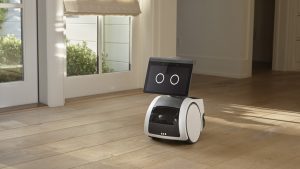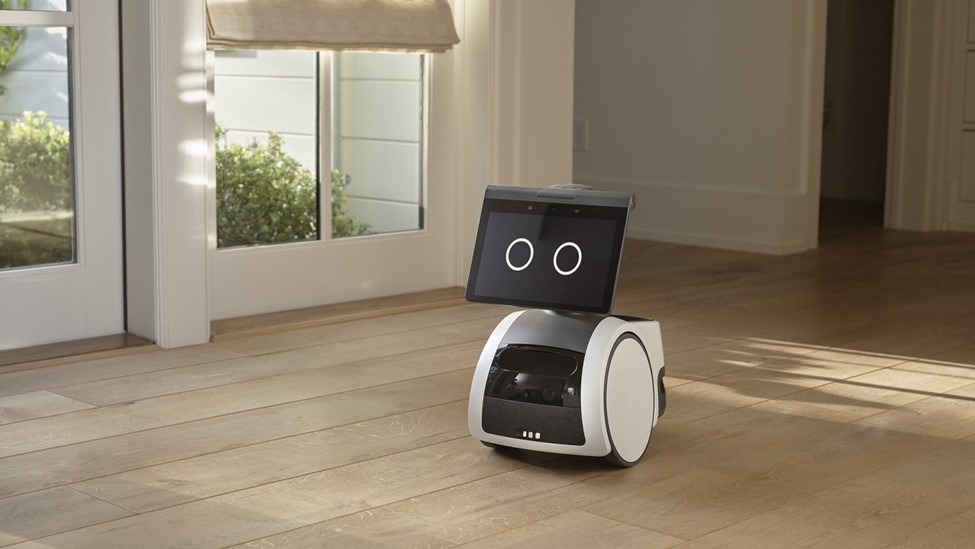By Hannah Ceriani
Amazon has just announced the launch of its newest voice-activated digital assistant, Astro.[1] Astro is a mobile robot that does everything that Amazon Alexa can and more.[2] It’s primary purpose is to patrol a home or check on pets and people.[3] Astro can be controlled remotely and has been programmed to express personality through a range of movements and expressions.[4]
With this launch, Amazon has attempted to pre-empt privacy concerns that emerged around its previous voice-activated digital assistants.[5] Astro owners can set “out of bounds zones” and turn off microphones and cameras.[6] An LED light located on a periscope turns green to notify the owner when it is streaming video or audio to the cloud.[7]
Voice-activated digital assistants keep a record of information such as personal doings, habits, whereabouts, interactions, and search history.[8] The information is available to the user anywhere, so long as they have a smartphone, tablet, or computer. It is tricky to delete information stored by these devices because although the device will delete the specific text, it will still maintain a record that a person ordered or searched for a particular good or service.[9]
Privacy concerns have been raised in the past because of the nature of how information is gathered and stored by these devices. Voice-activated digital assistants are virtually always listening for specific words – such as “Hey Google” – which then trigger recording.[10] A recording of the spoken phrase is then sent to a service platform, where it is translated into text.[11] The text is sent to a cloud storage, where the information is kept.[12]
One big issue is that the information gathered is no longer in the owner’s possession because it is stored at a facility rather than with the robot.[13] This was highlighted five years ago in State v. Bates, No. CR-2016-370-2 (Ark. Cir. 2016), where police officers believed that Amazon Echo had been used to play music on the night of the homicide in the alleged murderer’s home.[14] The officers wanted to access the data, so they served Amazon with two warrants requesting it, and Amazon eventually agreed to turn it over.[15] In fact, just in the first half of 2021, law enforcement around the world filed 30,000 similar information requests with Amazon.[16]
Some people feel that subpoenas and warrants for such information violate the owners’ Fourth Amendment rights.[17] However, case law has suggested that data collected by devices like Astro would not be protected because the owners’ information is disclosed to third parties and “there is no reasonable expectation of privacy in information disclosed to a third party.”[18]
The relatively new California Consumer Protection Act (“CCPA”) could help mitigate such privacy concerns. Even though it was passed in California, the CCPA has been adopted by several national and international companies, like Amazon, Netflix, Microsoft, Starbucks, and UPS.[19] Even people who are not residents of California may be protected by this law.[20] The CCPA gives people three rights if they take some action: (1) they can find out exactly what data has been collected about them; (2) they can instruct companies not to sell their data; and (3) they can ask companies to delete data provided that it is not restricting someone else’s rights.[21]
Even given the potential rights conferred on Astro owners under the CCPA, it is unclear whether Amazon has properly mitigated data privacy concerns. Are customers satisfied that they will not be recorded simply because the LED light isn’t green? If a subpoena or warrant covers Astro just like it does Alexa, would that essentially make it a surveillance device for law enforcement? If cybercriminals hack Astro, is there a greater capacity of data that can be stolen?
The controversy over data privacy in voice-activated digital assistants will likely become more widespread as technology advances. Legislation and regulation will continue to develop as technology such as Amazon Astro makes life easier for individuals, but also brings a slew of new privacy issues.
[1] Charlie Tritschler, Meet Astro, A Home Robot Unlike Any Other, Amazon (Sept. 28, 2021), https://www.aboutamazon.com/news/devices/meet-astro-a-home-robot-unlike-any-other.
[2] David Molloy, Amazon Announces Astro the Home Robot, BBC (Sept. 28, 2021), https://www.bbc.com/news/technology-58727057.
[3] Tritschler, supra note 1.
[4] Id.
[5] Molloy, supra note 2.
[6] Tritschler, supra note 1.
[7] Id.
[8] Eric Boughman et al., “Alexa, Do You Have Rights?”: Legal Issues Posed by Voice-Controlled Devices and the Data They Create, Am. Bar Ass’n (July 20, 2017), https://www.americanbar.org/groups/business_law/publications/blt/2017/07/05_boughman/.
[9] Bree Fowler, Amazon’s Astro May Be Cute, but Security Experts Warn of Privacy Concerns, CNET (Oct. 2, 2021, 5:23 A.M.), https://www.cnet.com/tech/amazons-astro-may-be-cute-but-security-experts-warn-of-privacy-concerns/.
[10] Boughman, supra note 8.
[11] Tom Bolton et al., On the Security and Privacy Challenges of Virtual Assistants, MDPI 2–3 (Mar. 26, 2021) https://www.mdpi.com/1424-8220/21/7/2312.
[12] Id.
[13] Boughman, supra note 8.
[14] Anne Pfeifle, Alexa, What Should We Do About Privacy? Protecting Privacy for Users of Voice-Activated Devices, 93 Wash. L. Rev. 421, 422 (2018) (referring to State v. Bates, No. CR-2016-370-2 (Ark. Cir. 2016)).
[15] Id.
[16] Fowler, supra note 9.
[17] Boughman, supra note 8.
[18] Id.
[19] Geoffrey A. Fowler, Don’t Sell My Data! We Finally Have a Law for That, Washington Post (Feb. 19, 2020), https://www.washingtonpost.com/technology/2020/02/06/ccpa-faq/.
[20] Id.
[21] Id.

Image Source: https://www.aboutamazon.com/news/devices/meet-astro-a-home-robot-unlike-any-other
